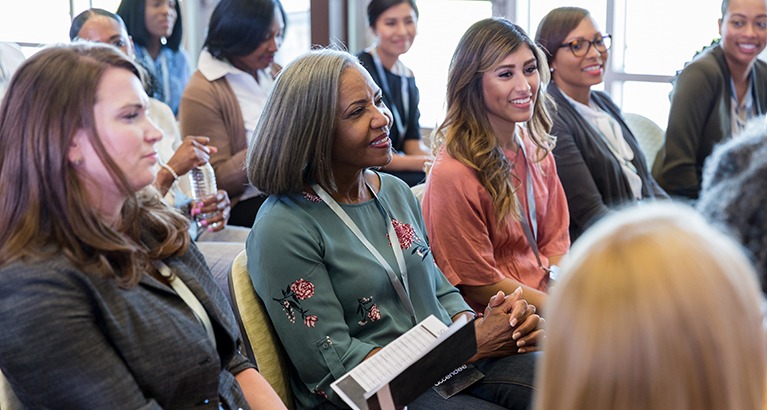In our digital age, activist communities often form online among people of similar interests and beliefs around the world, including those involved in educational reform. Yet there has been very little research on grassroots organising and solidarity building in education.
Research from the Cambridge Centre for Social Innovation (CCSI) at Cambridge Judge Business School examines the concept of collective leadership through a study of WomenEd, a movement of women in education who seek to tackle educational inequalities.
Looking at alternative organising to better understand leadership in schools
The research seeks a greater understanding of school leadership by focusing on alternative or postmodern forms of organising, which include ecosystems of activity occurring across organisations through networks and platforms like WomenEd – whose collective leadership for social change is termed ‘intersectional collaboration’ by the authors.
“The study observes a form of collective leadership underpinned by valuing difference, which enables participants to respond to oppressive school conditions and achieve shifts in autonomy and agential institutional influence”, says the research published in the journal ‘School Leadership and Management’. “The study thus advances understanding of collective power.”
The research is authored by Rosie Boparai, a Research Associate at the CCSI and a graduate of the MSt in Social Innovation degree programme at Cambridge Judge, and by Michelle Darlington, Head of Knowledge Transfer at the CCSI.
Says Rosie Boparai: “We noticed that there was a lack of research that looked at practices of solidarity building and feminist organising, and this meant significant gaps in how these change processes work. So we launched ethnographic research that allows detailed observation of organising across sectors, and this provides what we describe in our research as a ‘rich picture’ of the motivations behind this intersectional work as well as the work’s practices and results.”
Adds Michelle Darlington: “Although women make up the majority of the workforce in education, they are still underrepresented in senior leadership roles, as are other marginalised identities. Most schools, colleges and universities also still have a significant gender pay gap.
“WomenEd members believe more representative leadership will impact not only who leads education but also how it is led. This research helps us to better understand how traditional institutions of school leadership have marginalised women (and other already marginalised identities), and how the network are responding. The study focuses on identity work – showing how members of WomenEd organise collectively across organisations, geographic boundaries and backgrounds – to shift leadership representation towards identities embodied by those in the grassroots movement.”
Although women make up the majority of the workforce in education, they are still underrepresented in senior leadership roles, as are other marginalised identities. Most schools, colleges and universities also still have a significant gender pay gap.
Conducting a study looking at WomenEd social practices
WomenEd was founded in the UK in 2015, where it is now a charity. It has since expanded to 21 countries. During the study period the group had more than 44,000 followers on X (formerly Twitter), and most interaction between members is via X and WhatsApp. Members only infrequently meet in person, though there are some events known as WomenEd’s Unconferences in which people do network face to face.
The central question addressed in the research is: “How do members of WomenEd re-conceptualise leadership in organising for social change?”
The study is conducted through observations and interviews over a 3-year period. Interview data comes from 7 women who are among the most engaged in WomenEd, and who reflect a broad variety of social identities including Asian, mixed-race, White, disabled, LGBTQ+, heterosexual, middle-class and working-class (or combinations of these descriptions).
The research then identifies a number of practices WomenEd members engage in. These include:
- practices of collectivity that “form the backbone or network through which other practices can then operate”, involving sub-network creation, inclusion, and fostering novel relationships
- supported career advancement, including resources needed by network members to advance their position and meet career challenges
- identity exploration, in which network members explore issues and shared stories
What motivates members to be involved with WomenEd?
The study also shares insights on the motivations and effects of the work studied. These include experiences of isolation as a motivator to help others, unmet professional needs and ill-treatment.
7 insights from WomenEd experiences
The research includes direct quotations from the observational data and interviews, in which they address the central motivations and practices in their experiences in WomenEd. Here are some excerpts:
1
Creating sub-networks
“We really have gone global with the networks in WomenEd from Canada through the United States all the way through the UK and Europe down to the Middle East, down to Malaysia and over to Australia. It’s absolutely phenomenal that we now have 35 global networks across the world” – including WomenEd sub-networks for books, technology, Australia, Canada and the Middle East-North Africa.
2
Inclusion
“I just want to say thank you, I felt really alone as a leader after taking a career break and this network is combating that for me […]. We really support one another regardless of geographical location. I think what’s lovely about WomenEd is we support one another and no matter where or what or who we are.”
3
Building novel relationships
“Canada can contribute although our time zone is always a Canadian time zone so we don’t have the UK time. I get up in the middle of the night: that’s how much I believe in WomenEd.”
4
Building careers
“In my role within WomenEd I work individually so I use my position, I mentor them, yeah I advocate for the individuals, I help with real practical things like a job application.”
5
Member endorsement
“I’ve been supporting somebody on Twitter this last week […] I asked her whether she thought that the salary band was right for her, and she said ‘no I don’t, but I really want this job’, I said ‘so you’re just going to accept that salary band?’. ‘Well, there’s nothing else I can do, is there?’ […] I’m delighted to know with the bit of coaching, and a bit of bolstering, she moved up 4 points on the pay scale and accepted the job.”
6
Unmet professional needs
“I feel like it [WomenEd] gives you a chance and gives you enough confidence to say no […]. We need to understand there is (a) teacher shortage (but people) are settling for spaces where they’re not given opportunity to make progress in their career.”
6
Isolation
“The higher up you go the lonelier it can be, so (it’s useful) having a network of other women leaders in lots of different contexts you know all about the world […]. I see it as a as a professional supportive network for me that I can lean on.”
Collective leadership and the interaction between identity, career and institutional work
The study examines 3 distinct processes related to collective leadership: identity work, career work and institutional work – but cautions that these 3 strands cannot be seen in isolation. Under a model developed in the research, identity work and career work operate in parallel – and these are antecedent to institutional work.
“The proposition that these forms of work are unlikely to be separable is grounded in the belief that all 3 forms appear to be underpinned by the relational practices of collectivity”, says the study. “Collectivity is both constitutive of the relational network, and of the principles of organising via inclusion and embracing difference.”
Study offers a new form of collective leadership
The authors conclude that the research provides a “novel perspective on collective leadership, compelling us to contemplate how institutionalised relationships and roles contribute to leadership. We argue that the central locus of change lies in the ability to shift these relational networks, as this is where the resources for the effects of intersectional collaboration are derived.”
“The model developed (in the research) indicates how practices of collectivity, underpinned by intersectionality and inclusion, enable other processes of identity work and career work in this context, leading to shifts in autonomy and agency. Together these practices of ‘intersectional collaboration’ constitute a new form of collective leadership for social change, and provide a glimpse into the alternative forms of organising which may be mobilised to address ‘grand challenges’.”
Featured people
Michelle Fava Darlington
Head of Knowledge Transfer
Rosie Boparai
MSt in Social Innovation alumna
Featured research
Boparai, R. and Darlington, M. (2023) “‘Intersectional collaboration’: a new form of leadership from the WomenEd movement” School Leadership and Management





